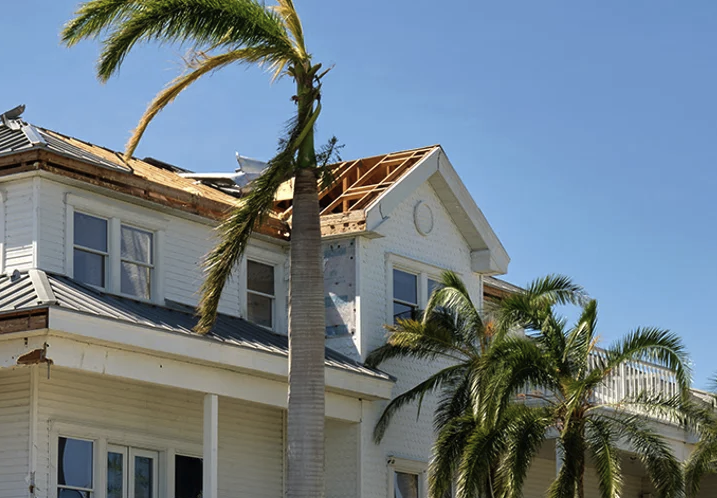Houston Storm Damage Guide: How to Protect Your Roof
By Shantell Moya · 8 months ago · 13 min read

Houston’s unpredictable storms make it important for you to protect your roof. These wild weather events can come on suddenly and may leave your roof open to damage you may only discover when it’s too late. I remember a neighbor who found out the hard way. A small leak quickly turned into a heavy downpour of water inside their home.
You need to know what warning signs to look for to keep your home safe. I’m going to share some tips about how to find damage early so you can tell when a temporary fix might help or when it’s time to call your insurance.
Let’s make sure your roof stays strong against the next storm! Keep in mind that step 1 is always to contact a trusted contractor and schedule a repair as quickly as possible to avoid water or wind damage. Please contact us today for a free estimate!
Damage Documentation Steps
After a storm hits Houston, you can always depend on your smartphone to help protect your investment, save you some time and cut down on your stress and costs during the claims process! You might not think about having clear documentation until you actually find yourself in a claims dispute. Dark or blurry images can make it harder to see the true damage and poor photos may hurt your case. When you miss a few angles that matter, it could even mean you don’t get any of the compensation you deserve.
Insurance adjusters want to see clear and well-lit photos from a few different angles. They need to see the view and the facts. You should take wide shots of the whole roof and also close-ups of any damaged shingles. Be sure to capture any water stains on your ceiling, too.
The more pictures you have, the faster your claim is likely to progress. Taking photos right after the storm matters quite a bit. The sooner you document the damage, the stronger your case is going to be. If you wait too long, it might raise suspicions about whether the damage actually came from the storm or from something else.
Your photos tell the full story of what happened to your home. They can show the insurance adjusters what needs fixing and also help contractors better understand the actual scope of the work. They’ll even give you a great basis for working out any repair costs. This is helpful when you need clear evidence for fair compensation.
Houston homeowners sometimes take photos from the ground, which can leave you missing some facts that matter. Storm damage often hits areas that aren’t visible from the ground. Use your zoom or step up to an upstairs window if you can. When you capture photos from different angles, it makes your record even stronger.
Having documentation also lets you track how damage changes over time. Water damage, in particular, is something that can spread fast after a storm. A clear record shows that you spotted the problems and reported them faster and it’ll help protect you from any claims of negligence later on.
How To Prevent More Damage?
When you live in the greater Houston area, you might face sudden storms that hit your roof hard. So you need to act fast with the easy fixes that’ll save you money later on. There are some easy things you can do to keep your home safe from any more damage.
You should always have a large-sized tarp on hand for emergencies. Choose one that extends at least four feet past the damaged area on every side so it covers everything well. Get it secured with bricks and sandbags so it stays in place even when the wind starts to pick up. Although it seems basic, a well-placed tarp helps protect your home from serious water damage and it works until you’re able to get professional repairs.
You can also use your buckets or your containers wisely. Place them right under the drips to catch the water before it reaches the floors or ruins your furniture. It also makes sense to move your belongings away from the leak because water can spread much faster if you leave them where they’re.
You don’t need to worry when you see loose and damaged shingles, either. You can reattach them for the time being with some roofing cement and just a few well-placed nails. For the small holes or cracks, you can add some silicone caulk or roofing sealant as a temporary fix and always wait until the surface is completely dry before putting any sealant on so it works.
Houston homeowners sometimes ignore these easy fixes because they sound too basic. They end up waiting for professional help while the water continues to cause damage. They don’t realize that these quick steps will save thousands in interior repair costs. A sturdy tarp and just a few tools can hold off serious problems until a professional roofer manages the repairs.
Keep your safety in mind when you’re working with roof damage. Never step on a wet roof and make sure to use a strong, stable ladder every single time you need to climb up.
When Should You Contact Insurance?
Storm damage can catch you off guard, especially if you live in Houston and wait too long to call your insurance company. It could result in denied claims and bigger problems down the road. Take the case of Houston resident Mark Stevens. He learned this the hard way when an extreme storm damaged his roof and he waited three days before calling his insurer. During that time, water seeped into his walls and his insurance company emphasized that he should have reported the damage sooner.
You should always let your insurance company know as soon as you can about any damage. They need to inspect the damage while the evidence is still fresh. Reporting faster also prevents small problems.
People often pause before contacting their insurance company after a storm. You might worry about higher rates, wonder if your policy covers the damage or hope the situation will somehow fix itself. Even though these reactions are completely normal, waiting too long can end up costing you more in the long run.
Your policy usually requires you to report any damage as soon as reasonably possible, typically within 24 to 48 hours of discovering it. If you delay too long, you risk putting your claim in jeopardy.
The longer you wait, the harder it can be to document the damage. Photos might not capture what happened and water stains may spread, which makes it hard to tell where they started. Any witnesses who saw the damage might also be hard to track down.
You’ll get better results from the claims process if you act faster. When you call your insurance company, they can send an adjuster to look at your home. They can even suggest emergency repairs to help protect your property. This prompt action helps make your claim process smoother and more likely to succeed.
Roof Repairs Timeline
When your roof is damaged by a storm, fixing it quickly can become your top priority. If you wait too long after your insurance approves the work, it might cause bigger problems down the road. Acting promptly helps you avoid extra complications that could’ve been prevented.
The weather plays a big part in how fast you can get your repairs done. Rain and high winds might push back the work you’ve scheduled. Even Houston’s mild winters can slow things down because materials like asphalt shingles need the right conditions to be installed. You should plan your repair schedule around these weather patterns to help cut back on delays.
The amount of damage you experience also affects your repair timeline. If you need just a few shingles replaced, the work could be finished in a few hours. But if there’s serious damage, the repair might stretch into a few weeks. Your contractor should give you a clear timeline so you know what to expect from start to finish.
Finding the right contractor can help your repairs go smoothly. You should look for local roofers (like us!) who understand Houston’s building codes and know which materials can handle our weather patterns. They’re also familiar with the paperwork and permits you’ll need. Insurance documentation can also help speed up the process.
Picking quality materials is as big a part of the process as hiring a skilled contractor. The right materials protect your home from future storm damage and offer you long-term results. Let your professional roofer tell you about the options that’ll give you the best protection for Houston’s climate.
The time of year you choose for your repairs matters, too. Fall usually brings more predictable weather, which helps speed up the repair process. Summer and spring tend to increase demand for roofing services. This may result in longer wait times and higher costs. When planning your repairs, keep these seasonal things in mind.
In most cases, professional roofers need between two and six weeks for a full roof repair and sometimes more if we’re waiting on insurance or permits. This period covers everything from ordering materials to securing the necessary permits. Keep in mind that weather delays or a busy contractor schedule might extend this timeline even more. Staying in regular contact with your contractor helps set clear expectations throughout the project.
The entire repair process will need patience and careful planning. You might even need to find additional documents for your insurance company before the work can start. Sometimes contractors uncover hidden damage that extends the timeline. Processing permits with local authorities will also likely take extra time.
Routine Roof Maintenance
Your gutters can do more for you than you might suspect. They actively work to help steer water away from your home during the regular storms that Houston often faces. If your gutters aren’t properly maintained, when water starts pooling it is most likely to seep under the shingles. This creates serious problems and can cost you a fortune down the line!
You should have a professional service your gutters at least twice a year so you can catch small problems before they grow into big and expensive repairs that are harder to manage. When you wait until you see a leak, you might already be dealing with damage that’s worse than it may seem from just the surface.
You need to take care of your roof since the local weather can hit Houston homes quite hard. The intense sun, the heavy rain and the strong winds all work together in ways that wear down even the sturdiest roofing materials over time. They can sometimes loosen shingles or cause small cracks that tend to get bigger over time. This leaves you with more challenges than you might expect.
You can extend your roof’s lifespan by doing a few easy maintenance tasks. Check your attic for water stains after a big storm and listen for any creaking noises when strong winds pick up. Also take a moment to look around outside for fallen branches or debris after extreme weather has passed.
You might worry about the costs of regular maintenance. But think about your alternatives. When you spend around $200 to $400 on basic repairs each year, you can avoid needing a full roof replacement later. That could run into thousands of dollars. Insurance companies often don’t cover damage that happens because of poor maintenance, so taking care of these problems early helps you.
You need to understand that roof care isn’t something you want to delay until it’s too late. A small leak during spring showers can quickly turn into a big problem. When you miss a few shingles, it might not seem like a big deal. Then you find that strong winds have torn away an entire section of the roof.
The Weather Factors
You live in the Greater Houston Area and protecting your roof here comes with its own set of challenges. Our weather hits hard with hurricanes, hailstorms and relentless heat, so your roof gets a heavy workout all year long!
You can see these challenges, especially during hurricane season. Strong winds will rip off shingles and hurl debris at your roof (sometimes at shocking speeds). Even a mild Category 1 hurricane can cause devastating damage if your roof isn’t secured. You can also feel the effects of our brutal heat.
When summer days climb above 97 degrees, your roofing materials bear the stress. Non-stop sun and UV rays slowly make the shingles brittle and weak. You might not see this type of damage until it’s too late.
You might think that a little hail isn’t a concern. But even small dents can create vulnerable places on your roof. Over time, these flaws can cause leaks that show up months or even years later. One bad hailstorm could end up drastically shortening your roof’s expected lifespan.
You’ve probably seen how extreme weather in the Greater Houston Area has become more common over the last decade. Hurricane Harvey in 2017 showed just how devastating these storms can be. Experts also warn that even more extreme conditions could be approaching.
You can feel the pressure when high winds and heavy rains hit at the same time. In these storms, winds can reach speeds as high as 100 mph and they’ll rip off materials and push water into small cracks. You might have seen the long-term damage on homes around you from events like the Tax Day Floods of 2016 or Tropical Storm Allison.
A Secure Home Starts with a Solid Roof
We all remember that surprising snowfall in Houston last month or that unforgettable 2021 Houston winter storm! They can also give you an idea of just how unpredictable the weather can be. It makes you realize that Mother Nature loves to challenge us.
Take some time to remember how prepared your home could be. Every story from your community helps to drive this big idea home. You can sometimes see that it takes just one big storm to remind you to check your roof. That kind of experience tells you to act sooner rather than later.
At Roof Republic, we keep your home and business safe with reliable and professional roofing services. We call Texas our home and work in the Greater Houston Area, covering beautiful places like Magnolia, Tomball, Cypress, Conroe and other areas. You need to protect that investment with a roof that can stand up to whatever weather might bring. A free roof inspection from us will help you determine where you currently stand.
Connect with us and let’s manage your roofing requirements with the expert care you deserve. We can’t wait to help you stay safe and protected!




Comments
Sort by: